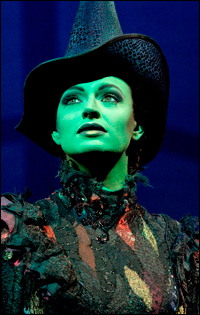
*
Midway between Broadway and Eighth Avenue on West 50th Street is a chunk of real estate that houses the alpha and omega of Stephen Schwartz. His first and most produced musical, Godspell, at Circle in the Square Theatre, has come to roost right next door to his latest and most profitable musical, Wicked, at the Gershwin.
Schwartz's Broadway credits in between are skimpy — Pippin, The Magic Show and Rags, plus individual song contributions to Working and Fosse — but he's the only composer (and lyricist) to have three shows play more than 1,900 performances on Broadway (Wicked, Pippin and The Magic Show). "Godspell," he asterisks, "doesn't count as Broadway. It ran 2,700 performances, but only 500 of those were on Broadway."
The only creative to top that is the lone member of "The 2,000 Club" — book writer Thomas Meehan, of Annie, The Producers and Hairspray.
How does it feel to have such dizzying statistics dropped on his doorstep? "Weird," Schwartz shoots back. "I've had a lot of popular success, but I'm not at all a critics' darling — particularly in New York. More so elsewhere. In New York, I've never had that kind of success with the press, so it's a mixed bag. Ultimately, you can't worry about it. You just have to do the best shows you can and hope people will respond." Certainly, people responded mightily to the Exhibits A and B now on West 50th. Even their creator concedes each is a phenomenon, but believes "there are very different reasons why they speak to people. With Wicked, it has to do with people's identification with Elphaba — with the outsider — and also with the relationship between her and Glinda. People come out elated, uplifted — and the same is true of Godspell, although it doesn't have the happy ending, of course. Still, people come away feeling better. They feel they've earned the right to feel good. There's a joy that comes from the story and also from the theatrical experience — from just having that kind of experience in the theatre. There's basically no set. It's just actors and energy and words and music and the exhilaration that theatre provides."
 |
||
| Current Wicked star Jackie Burns |
||
| photo by Joan Marcus |
Similarly, he was tapped to turn the Gospel according to St. Matthew into a musical not because he knew director John-Michael Tebelak and most of the cast from his old Carnegie Mellon days, but because he was peddling Pippin to producer Edgar Lansbury, who instead hired him for a new Godspell score.
"I literally saw the show on its final night at Café La MaMa — on March 7, the day after my 23rd birthday. The next workday, I met with Edgar and signed on. He said, 'Great. We go into rehearsal April 11,' so basically, I had five weeks to write the score."
Several things conspired to make this "Mission: Impossible" doable. "First of all, I was too young and inexperienced to know I couldn't do the assignment. The other thing was the lyrics. For me — and most people who write both words and music — lyrics take the longest time. The music comes relatively quickly. There are those famous stories about Oscar Hammerstein II slaving for three weeks on a lyric and finally bringing it to Richard Rodgers, who looks at it for a minute and immediately knocks out the right melody. It's like that for me, working with Alan Menken. The reason I make this distinction is that most of Godspell's lyrics I didn't write. They're from the Episcopal hymnal — plus a psalm and a biblical passage I adapted."
The show's big "chartbuster" — the hypnotically haunting "Day by Day" — had a verse originally written in the 13th century by one Saint Richard of Chichester. "Basically, it was six lines repeated over and over, in more elaborate harmony and choral arrangement but the same tune nevertheless. The idea was to write something that, by the end of the first time you heard it, you could sing along with it. Simplicity was a requirement of the concept, and that's what made it a popular hit. The people who published the score wanted me to add more words. I said, 'I can't do that. They're not my words to begin with. That, unfortunately, is what the song will have to be.'"
The song and the show became enormous hits, and four decades later they're back with us, officially opening Nov. 7.
David Byrd's classic Godspell logo — a wavy-haired youth with a clownishly big red beauty mark — now shares the bill with the equally iconic green-skinned witch of Wicked. It's all quite Christmas-y, very Miracle-on-50th-Street for Schwartz. "I just love the sort of red and green of it all," he trills blissfully.










